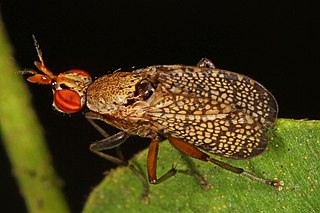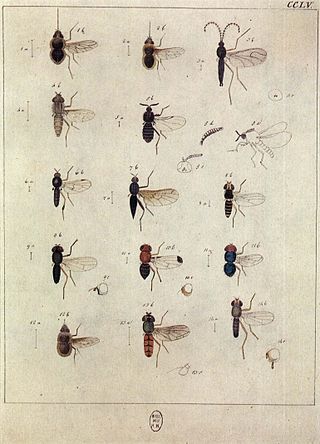
The family Sciomyzidae belongs to the typical flies (Brachycera) of the order Diptera. They are commonly called marsh flies, and in some cases snail-killing flies due to the food of their larvae.

The Drosophilidae are a diverse, cosmopolitan family of flies, which includes species called fruit flies, although they are more accurately referred to as vinegar or pomace flies. Another distantly related family of flies, Tephritidae, are true fruit flies because they are frugivorous, and include apple maggot flies and many pests. The best known species of the Drosophilidae is Drosophila melanogaster, within the genus Drosophila, also called the "fruit fly." Drosophila melanogaster is used extensively for studies concerning genetics, development, physiology, ecology and behaviour. Many fundamental biological mechanisms were discovered first in D. melanogaster. The fruit fly is mostly composed of post-mitotic cells, has a very short lifespan, and shows gradual aging. As in other species, temperature influences the life history of the animal. Several genes have been identified that can be manipulated to extend the lifespan of these insects. Additionally, Drosophila subobscura, also within the genus Drosophila, has been reputed as a model organism for evolutionary-biological studies, along with D. sechellia for the evolution of host specialization on the toxic noni fruit and Scaptomyza flava for the evolution of herbivory and specialist on toxic mustard leaves.

Odiniidae is a small family of flies. There are only 58 described species but there are representatives in all the major biogeographic realms.

Canacidae, incorrectly Canaceidae, or beach flies, surf or surge flies, is a family of Diptera. As of 2010, 307 species in 27 genera. The family now includes Tethininae as a subfamily.

The Coelopidae or kelp flies are a family of Acalyptratae flies, they are sometimes also called seaweed flies, although both terms are used for a number of seashore Diptera. Fewer than 40 species occur worldwide. The family is found in temperate areas, with species occurring in the southern Afrotropical, Holarctic, and Australasian regions.

Cyamops is a genus of flies.

Periscelididae is a family of flies.
Meoneura is a genus of carnid flies (Diptera).

Rachispoda is a genus of flies belonging to the family Lesser Dung flies.

Tetanocerini is a tribe of flies in the family Sciomyzidae. There are more than 400 described species in the tribe.

The family Pseudopomyzidae comprises minute to small (1.7–5.5 mm), dark-coloured acalyptrate flies; formerly they have been treated as a subfamily of Cypselosomatidae
Periscelis is a genus of flies in the family Periscelididae. There are about 15 described species in Periscelis.
Hyadina is a genus of shore flies in the family Ephydridae.

Desmometopa is a genus of freeloader flies in the family Milichiidae. There are more than 50 described species in Desmometopa.

Odinia is a genus of flies in the family Odiniidae. There are more than 20 described species in Odinia.
Leptometopa is a genus of freeloader flies in the family Milichiidae. There are about 19 described species in Leptometopa.
Paramyia is a genus of freeloader flies in the family Milichiidae. There are about 18 described species in Paramyia.

Sciomyzinae is a subfamily of flies in the family Sciomyzidae.












